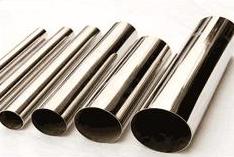 310 Stainless Steel Pipes & Tubes 310 Stainless Steel Pipes & Tubes

Grade 310, combining excellent high temperature properties with good ductility and weld ability, is designed for high temperature service. It resists oxidation in continuous service at temperatures up to 1150°C provided reducing sulphur gases are not present. It is also used for intermittent service at temperatures up to 1040°C.
Grade 310S (UNS S31008) is used when the application environment involves moist corrodents in a temperature range lower than that which is normally considered "high temperature" service. The lower carbon content of 310S does reduce its high temperature strength compared to 310.Like other austenitic grades these have excellent toughness, even down to cryogenic temperatures, although other grades are normally used in this environment.Grade 310L (and proprietary versions of this grade), is a 0.03% maximum carbon version of 310, sometimes used for very specific corrosive environments, such as urea production.
Product Range
Specifications: ASTM A/ASME SA213/A249/A269/A312/A358 CL. I to V ASTM A789/A790
Sizes (Seamless): 1/2” NB - 24” NB
Sizes (ERW): 1/2” NB - 24” NB
Wall Thickness available:
Schedule 5S - Schedule XXS (heavier on request)
»Other Materials Testing:
NACE MR0175, H2 SERVICE, OXYGEN SERVICE, CRYO SERVICE, etc.
Dimensions:
All Pipes is manufactured and inspected/tested to the relevant standards including ASTM, ASME and API etc.
Composition
Typical compositional ranges for grade 310 stainless steels are given in table 1.
Table 1. Composition ranges for 310 grade stainless steel
| Grade |
|
C |
Mn |
Si |
P |
S |
Cr |
Mo |
Ni |
N |
| 310 |
min. |
- |
- |
- |
- |
- |
24.0 |
- |
19.o |
- |
| max. |
0.25 |
2.00 |
1.50 |
0.045 |
0.030 |
26.0 |
- |
22.5 |
- |
| 310S |
min. |
- |
- |
- |
- |
- |
24.0 |
- |
19.o |
- |
| max. |
0.08 |
2.00 |
1.50 |
0.045 |
0.030 |
26.0 |
- |
22.0 |
- |
Mechanical Properties
Typical mechanical properties for grade 304 stainless steels are given in table 2
Table 2. Mechanical properties of 304 grade stainless steel
| Grade |
Tensile Strength (MPa) min |
Yield Strength 0.2% Proof (MPa) min |
Elongation (% in 50mm) min |
Hardness |
| Rockwell B (HR B) max |
Brinell (HB) max |
| 310 |
515 |
205 |
40 |
95 |
217 |
| 310S |
515 |
205 |
40 |
95 |
217 |
Physical Properties
Typical physical properties for annealed grade 304 stainless steels are given in table 3.
Table 3. Physical properties of 304 grade stainless steel in the annealed condition
| Grade |
Density (kg/m3) |
Elastic Modulus (GPa) |
Mean Coefficient of Thermal Expansion (m/m/°C) |
Thermal Conductivity (W/m.K) |
Specific Heat 0-100°C (J/kg.K) |
Electrical Resistivity (n.m) |
| 0-100°C |
0-315°C |
0-538°C |
at 100°C |
at 500°C |
| 310/S |
7750 |
200 |
15.9 |
16.2 |
17.0 |
14.2 |
18.7 |
500 |
720 |
Grade Specification Comparison
Approximate grade comparisons for 304 stainless steels are given in table 4.
Table 4. Grade specifications for 304 grade stainless steel
| Grade |
UNS No |
Old British |
Euronorm |
Swedish SS |
Japanese JIS |
| |
|
BS |
En |
No |
Name |
|
|
| 310 |
S31000 |
310S24 |
- |
1.4840 |
X15CrNi25-20 |
- |
SUH 310 |
| 31S |
S31008 |
310S16 |
- |
1.4845 |
X8CrNi25-21 |
2361 |
SUS 310S |
These comparisons are approximate only. The list is intended as a comparison of functionally similar materials not as a schedule of contractual equivalents. If exact equivalents are needed original specifications must be consulted. |
Corrosion Resistance
The high chromium content - intended to increase high temperature properties - also gives these grades good aqueous corrosion resistance. The PRE is approximately 25, and seawater resistance about 22°C, similar to that of Grade 316. Excellent resistance at normal temperatures, and when in high temperature service exhibits good resistance to oxidizing and carburizing atmospheres. Resists fuming nitric acid at room temperature and fused nitrates up to 425°C.
Subject to stress corrosion cracking but more resistant than Grades 304 or 316.
Heat Treatment
Solution Treatment (Annealing) - heat to 1040-1150°C and cool rapidly for maximum corrosion resistance. This treatment is also recommended to restore ductility after each 1000 hours of service above 650°C, due to long term precipitation of brittle sigma phase.
These grades cannot be hardened by thermal treatment.
Applications
Typical applications include:
- Furnace parts
- Oil burner parts
- Carburizing boxes
- Heat Treatment baskets and jigs
- Heat Exchangers
- Welding filler wire and electrodes
|



